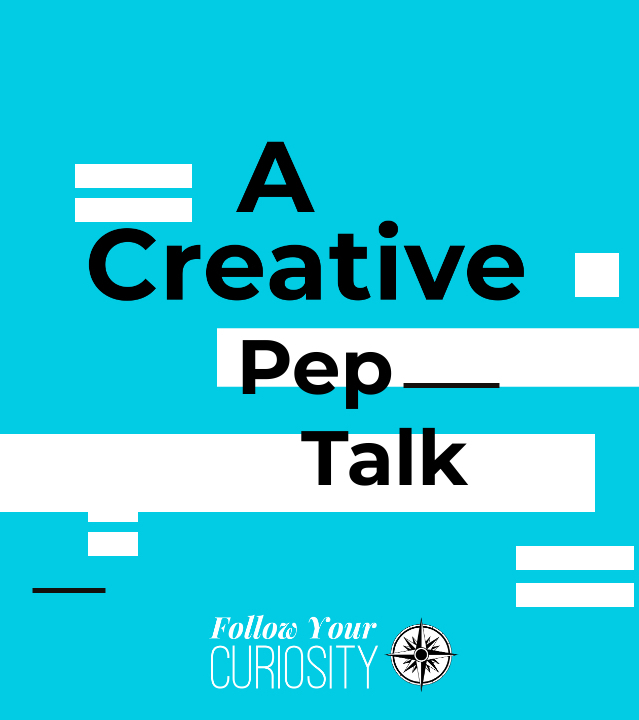
After our last pep talk, where I looked at what I’m learning from reading War and Peace over the course of a year, I noticed a little more about what happens when you break a process into small pieces over time. Some further thoughts on the magic of small steps over time in this short episode.
Simon Haisell’s year-long War and Peace read can be found here.
Want more tips? Check out this playlist with all my previous Creative Pep Talks!
Could you leave a review? It’s really easy, and it helps SO much. Thanks!
Join my free creative community, The Spark! We celebrate each other’s creative courage, and I’ll be sharing programs for subscribers and listeners there in the coming months.
Get in Touch
I’d love to hear your feedback, questions, and experience with these ideas! Send me a note at fycuriosity.com, or contact me on Facebook, Instagram, or Twitter.
Subscribe!
You can subscribe to Follow Your Curiosity via the handy links at the top of the page for Apple Podcasts, Spotify, iHeart Radio, TuneIn, and YouTube. If you enjoyed the episode, don’t forget to tell your friends!

Transcript: Building Momentum
Please note: This is an unedited transcript, provided as a courtesy, and reflects the actual conversation as closely as possible. Please forgive any typographical or grammatical errors.
Nancy Norbeck [00:00:06]:
Welcome to Follow Your Curiosity. Ordinary people, extraordinary creativity. Here’s how to get unstuck. I’m your host, creativity coach, Nancy Norbeck. Let’s go. Hey, everybody. This is Nancy Norbeck with this week’s Creative Pep Talk. And the last time that I was here with a new episode, I talked about how this year I’ve been reading War and Peace.
Nancy Norbeck [00:00:31]:
And, you know, massive book, scares everybody, but I’ve been reading it one chapter a day because there are, I think, 360 chapters roughly. So there’s almost perfectly one chapter a day for the year with about 5 days that you don’t have to read anything. So works out really, really well, and it’s a great example of small steps. So at this point, the middle of September, I’m about 3 quarters of the way through the book. No surprise there. Basic math. Right? And what I hadn’t thought about until after I recorded the last pep talk is the way that when I started the book back in January, it would have been really, really easy in the 1st month or so to say, you know what? Not into this. Not doing it.
Nancy Norbeck [00:01:25]:
Gonna let it go. Right? In the 1st 30 days, even with 30 chapters, and I will say, and I don’t think I said this last time, I recommend if you’re going to read a book like War and Peace, the advice that someone gave me several years ago about reading Proust, Because both of them are really big books, read it on the Kindle because you can’t or or whatever device because you can’t be as intimidated by the physical size of the book so much because you don’t have the physical book in your hand. But if if you, you know, were physically intimidated by the size of the book or or for some reason in, say, the 1st 30 days, just said, nah. Not into it. Whatever. You could easily shelve it. Right? But by the time you get, say, to the end of March, maybe a little sooner, maybe a little later, depending on you and your particular sensibility, you reach a point where you are invested enough. And some people would kind of associate this with a sunk cost that you’re not gonna give up.
Nancy Norbeck [00:02:36]:
You reach a kind of momentum. You’ve you’ve put in enough effort. You’re gonna see this thing through. Certainly, by this point in the book, that is definitely true. But even earlier in the year, that was true for me. I realized that I was at a point where I was not going to give up because I had already invested enough energy into this book. And I really think that that is true for any long project, certainly also for shorter projects, but in a different way. But if you are embarking on a long project, and even if you don’t realize that it’s a long project when you start, when you’ve put a certain amount of effort into it, it takes on its own momentum.
Nancy Norbeck [00:03:22]:
And that momentum after a certain period of time becomes self sustaining. And so this is part of what is valuable about doing something in small steps over time is that it builds that kind of self sustaining energy. Now you may recall that a year or so ago, I also did a pep talk that was based on having read Annie Duke’s book called quit because sunk cost is a thing that does get us into trouble. So part of to doing something this way and having that kind of momentum is having the discernment to know when the momentum and the sunk cost is working in your favor and when it’s not. So I am certainly not saying that if you are putting in good effort after bad or bad effort after good, whichever way that goes, that you should keep going no matter what. But when you’re working on something that you really love, that you really wanna do, that is working really well, that is self sustaining, this is when doing a little bit every day, even when you wish you could do more, sometimes that’s a great thing too. That’s part of why I have been known to leave off writing in the middle of a sentence because I know where I need to pick up the next day. The energy is still there.
Nancy Norbeck [00:04:46]:
It makes it super easy to get started the next time. There’s a benefit to that. That energy will propel you all on its own and make it much easier on you. So, you know, it’s, it’s not always a bad thing to have to work in small pieces over a period of time. It’s a lot like reading this book this year. So it’s just something to consider. A lot of the time, we really think that we have to sit down and do everything in large chunks to do it all at once because that’s what society tells us is supposed to be the way it happens. But that’s not always practical, and it’s not always good for us.
Nancy Norbeck [00:05:28]:
So just something to think about as you’re approaching your own creative work or anything else in your life. Sometimes doing stuff in small pieces actually works better for any number of reasons. So think about it. See where you can give this a try in your life, whether it’s reluctantly out of necessity or because you wanna experiment with it. And as always, I love hearing how these things work for you. So feel free to get in touch. And with that, I’ll see you next time. If this episode resonated with you, or if you’re feeling a little bit less than confident in your creative process right now, join me at the spark on Substack as we form a community that supports and celebrates each other’s creative courage.
Nancy Norbeck [00:06:12]:
It’s free, and it’s also where I’ll be adding programs for subscribers and listeners. The link is in your podcast app, so sign up today. See you there and see you next week. Follow Your Curiosity is produced by me, Nancy Norbeck, with music by Joseph McDade. If you like Follow Your Curiosity, please subscribe, rate, and review on Apple Podcasts or wherever you get your podcasts. And don’t forget to tell your friends. It really helps me reach new listeners.
